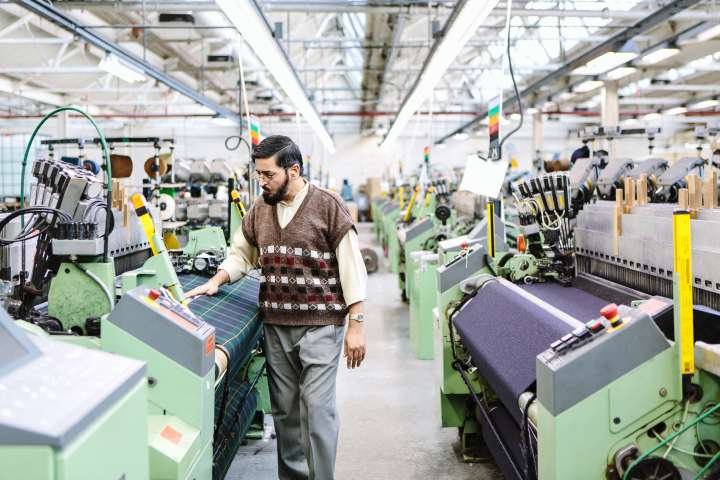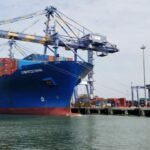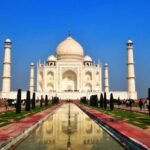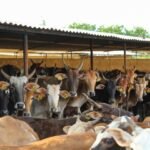Ministry of Textiles has approved the establishment of 7 mega integrated textile parks in India across seven states.
This initiative aims to strengthen India’s textile industry on both local and global fronts and encourage foreign and domestic investments.
These mega textile parks are termed PM MITRA, which stands for Prime Minister Mega Integrated Textile Region and Apparel Parks.
The PM MITRA scheme, inspired by the Prime Minister’s 5F vision, aims to build a complete textile ecosystem from Farm to Fiber to Factory to Fashion to Foreign.
This model aims to make India self-reliant and become a global leader in the textile market.
These textile parks in India even help to achieve the United Nations Sustainable Development Goal 9 to build a resilient infrastructure, promote sustainable industrialization, and foster innovation.

Quick Facts of PM MITRA Mega Textile Parks in India
- These textile parks will feature large-scale, modern facilities that encompass the entire value chain of the textile industry.
- Each mega textile park will span over 1,000 acres to accommodate multiple textile companies and supporting infrastructure.
- Each hub is projected to attract investments of approximately Rs 10,000 crore.
- These mega textile parks in India will generate 1 lakh direct jobs and 2 lakh indirect jobs, boosting regional employment opportunities.
- PM MITRA parks are categorized into Greenfield and Brownfield sites depending on the designated land and infrastructure.
- Greenfield sites will receive an initial capital support of 30% from the Central Government with a cap of 500 crore.
- After a thorough assessment, the Brownfield site’s maximum capital support from the Central Government for development will be 200 crores.
- The State and Central Governments will jointly own a special purpose vehicle that will develop these parks under a public-private partnership model.
1. The Mega Textile Park, Virudhunagar, Tamil Nadu
Known as the yarn bowl of India, Tamil Nadu has been the leader in India’s textile sector for many years.
The state boasts various textile capacities, including spinning, weaving, knitting, and ready-made garment production.
Tamil Nadu is the first state to get the PM MITRA textile parks in India.
Inaugurated on 22nd March 2023, this textile park is located at E. Kumaralingapuram village of Virudhunagar district, Tamil Nadu’s largest cotton-producing region.
The mega textile park is established on 1,052 acres and has an estimated budget of 2,000 crores.
It is conveniently located near National Highway 44, providing excellent connectivity to major cities such as Madurai and Tirunelveli.
On top of that, the nearest seaport, Thoothukudi, is just a two-hour drive away.
Virudhunagar Mega Textile Park is expected to attract investments of 19,000 crores and create employment for over two lakh people.
This textile park features an integrated value chain with multiple manufacturing zones. It offers plug-and-play infrastructure, logistics support, and various shared amenities.
2. Kakatiya Mega Textile Park, Warangal, Telangana
The sanctioning of PM MITRA mega textile park in Telangana’s cotton hub, Warangal, is truly welcoming.
This milestone can harness Telangana’s textile capability and create numerous employment opportunities.
Choosing Warangal as the spot for this mega venture is no surprise. It is Telangana’s highest cotton-producing district, with established ginning and pressing facilities operating for several decades.
Moreover, It was once the seat of the Kakatiya kingdom, where the rich cultural art of handlooms thrived.
Today, the region has several skilled handloom workers who run independently or under cooperative societies.
The hub will be set up on 1190 acres at Shayampet and Chintalapalli Village of Geesugonda and Sangem Mandal.
It provides state-of-the-art infrastructure, allowing multiple textile and apparel industries to operate smoothly.
These facilities include a skill development center, warehouses, a marketplace for finished goods, product display centers, and a testing laboratory.
The hub boasts excellent logistical connections to roads and railways, with a national highway located within 20 km and the nearest railway station within 15 km.
3. Kalaburagi Mega Textile Park, Karnataka
Karnataka will host the new PM MITRA Textile Park in the Kalaburagi (Gulbarga) region under an area of 1000 acres.
This mega textile park aims to create a complete textile value chain under one roof, aligning with the 5F vision.
A 220 KV power substation will be set up to provide 180 MW of electricity for the textile hub.
To fulfil the water requirements, State government plans to source water from the Madri barrage and revitalize an on-site lake.
Successful operation of Karnataka’s PM MITRA Park is expected to generate over one lakh direct and two lakh indirect jobs, significantly benefiting the local youth.
To support the PM MITRA initiative, the Karnataka Government will receive a 500 crore grant from the central government. These funds will be used in two phases to develop essential infrastructure like roads, electricity, and water supply.
4. Amravati Textile Park, Maharashtra
Maharashtra, a robust industrial state, is home to some of the major textile parks in India. It has been a dominant textile and apparel manufacturing state for several decades.
As one of the leading cotton producing states in India and as the largest textile exporter, Maharashtra naturally emerged as the chosen location for this mega hub.
With Amravati PM MITRA park, the state is poised to strengthen its industry further, creating numerous jobs and driving innovation and foreign investments.
Set over 1020 acres at Nandgaon Peth, adjacent to the additional Amravati Industrial Area; the park comes under brownfield park.
Strategically, it is located just 30 km from the Mumbai-Nagpur Samruddhi highway and 147 km from Wardha dry port.
The Maharashtra Industrial Development Corporation and the Ministry of Textiles, Government of India, signed a memorandum of understanding to mark the launch of this textile park.
Amravati Textile Park is expected to draw 10,000 crores in investment and create around three lakh direct and indirect jobs.
5. Navsari Textile Park, Gujarat
Gujarat, often called the Manchester of the East, has long been a powerhouse of India’s textile industry.
With its extensive network of over 49 seaports, the state serves as a vital link to markets in Europe, Africa, and the Middle East.
It has 18 specialized textile clusters and over 28 industrial training institutes providing training courses in the textile and garment industry.
Moreover, the state has several premier textile and apparel manufacturing institutes.
The addition of PM MITRA textile park in Vansi village, Navsari district, will further boost the state’s potential in the textile industry.
Located near the Surat textile cluster, this textile park is spread across 1,142 acres.
It has exceptional connectivity with Surat airport at 55 km, Hazira sea port at 66 km, and even Navsari railway junction at 19 km.
Furthermore, it is also well connected to state highway 196 and national highway 48.
The Navsari PM MITRA park is anticipated to attract investments of up to 10,000 crores and create two to three lakh jobs.
Some state-of-the-art facilities include a center for textile excellence, common processing units, and housing for workers.
6. Mega Textile Park, Lucknow, Uttar Pradesh
The textile industry serves as a major source of revenue for the state of Uttar Pradesh.
This state showcases a rich heritage of skilled artisans and is famous for its diverse range of textile products, including sarees, mats, carpets, apparel, furnishings, and heavy fabrics.
As the third largest fabric producing state in India, Uttar Pradesh contributes 13.24% to the national textile production.
It is home to nearly two lakh handloom weavers and around five lakh power loom weavers and hosts numerous small to medium textile clusters.
Giving a significant boost to UP’s textile sector, the Indian Government has established the PM MITRA Textile Park in Attari village, Lucknow, covering 1,100 acres.
Located just 20 km from National Highway 20 and State Highway 20, the park is expected to draw investments of 10,000 crores.
Like other textile parks, this park is also expected to provide employment opportunities to one lakh individuals directly and two lakh indirectly.
This initiative will operate via a special purpose vehicle under a public-private partnership. The Central Government will fund 500 crore for the development of essential infrastructure.
This park will feature an incubation center, plug-and-play facilities, a common processing unit, and facilities for design and testing.
7. Dhar Mega Textile Park, Bhensola, Madhya Pradesh
Among the mega textile parks in India, the one that is going to be set up in Madhya Pradesh holds special importance due to its heritage cotton and silk industries.
Madhya Pradesh hosts 60 large textile mills, operates over 4,000 looms, and utilizes more than 2.5 million spindles.
Renowned for its traditional weaving and printing techniques, Madhya Pradesh boasts popular textiles like Chanderi cotton, Maheshwari sarees, and Bagh Print, all of which have received geographical tag indications.
Considering the advantages, the Indian Government, on March 2023, formally approved starting a PM MITRA Mega Textile Park in Madhya Pradesh.
The Textile Park will be operated in Bhensola village, Dhar district, which has a land area of 1,563 acres. The entire land area is under the Madhya Pradesh Industrial Development Corporation (MPIDC).
Connectivity-wise, it lies 110 km from Indore and 85 km from the Pitampur Industrial cluster. The famous Delhi-Mumbai expressway is just 50 km from the textile park, allowing it to ship goods to Delhi much quicker.
It will feature essential infrastructure, such as roads, electricity, and a common effluent treatment plant. Special facilities include hostels for workers, skill development centres, and logistics services.
Additionally, MPIDC will apply for a Power DISCOM license to offer lower electricity prices of around INR 4.50 per unit.
Overall, the MP’s PM MITRA Textile Park is set to create 50,000 direct and 150,000 indirect jobs, primarily benefiting the tribal youth of Malwa region.









